SINGAPORE: Netizens slammed Senior Minister Lee Hsien Loong’s remarks on national identity, arguing that it has been diluted because the government has allowed too many foreigners to settle in Singapore.
The backlash came after Lee, speaking at the Kent Ridge Ministerial Forum 2025 on Tuesday (9 Sept), acknowledged that while Singapore’s national identity has grown stronger through different crises, it may not be the sole or most important marker for many citizens.
Held at the National University of Singapore (NUS) and attended by about 800 students and academics, the forum saw Lee highlight that other aspects such as race, religion, language, political views and even sexual orientation also play important roles in shaping identity.
“For many people, being Singaporean is important, but it may not be the most important part of your identity, and we have to accept that’s the way people are,” he said.
Multiple Layers of Identity
Lee noted that national identity is stronger today compared with the past.
However, a recent survey by the Institute of Policy Studies showed that while nationality continues to rank highly, religion has become increasingly significant in Singaporeans’ lives.
“I think I can say that the national identity is stronger but at the same time, it is not the only tribe which we belong to,” said Lee.
“We all have different layers to our identity.”
He cautioned that these differences also carry potential “fault lines” that must be managed, particularly in areas of race, religion and language.
External Pressures and Globalisation
During the dialogue moderated by NUS Associate Professor Leong Ching, Lee was asked whether globalisation or internal divisions posed a bigger challenge to national identity.
He replied that “powerful external forces” will from time to time pull Singaporeans in different directions, but it is important to resist fragmentation.
“Our job is to remember: ‘Yes, I am Muslim, or I’m Chinese, or I’m Indian, but I’m also Singaporean. I do hold something here, I belong here, and I should look at the world starting from here,’” he said.
Choice and Conviction
Reflecting on remarks once made by Singapore’s first Foreign Minister, S Rajaratnam, Lee said that being Singaporean has always been a matter of “conviction and choice”, not ancestry.
He contrasted the founding generation’s decision to “stand, fight, and build” with the current generation’s choices, which may include staying to continue Singapore’s progress or seeking opportunities elsewhere.
“For this generation too, it has to be choice and conviction,” he said.
“If you just so happen to be here and tomorrow the wind blows ‘poof’, tomorrow you won’t be here, and Singapore won’t be here.”
What Makes Singaporeans Distinctive
Asked by a student about what has worked in forging Singapore’s identity, Lee pointed to decades of policies encouraging compromise and collaboration across different groups.
These social adjustments, he said, have made Singaporeans “distinctive”.
“That’s why when you see a Singaporean overseas, you kind of know he’s one before he opens his mouth,” Lee said.
“A Chinese Singaporean is different from a Chinese from China, and likewise for an Indian or Malay Singaporean.”
Rejecting the notion of pretending that everyone is the same, Lee argued that acknowledging differences is essential.
“If we don’t acknowledge the reality of the differences, we only push the problems under the surface,” he said.
On how to further strengthen national identity, Lee cited the Forward Singapore exercise, a nationwide initiative launched by the fourth-generation leadership team.
He encouraged young Singaporeans to “roll up (their) sleeves” and actively participate in nation-building, whether through environmental work, social service, or entrepreneurship.
“In doing it, you will find that you feel yourself belonging to this place,” he said.
Political Stability and Unity
Turning to politics, Lee was asked about how Singapore can sustain an “exceptional” political system.
He stressed the importance of attracting capable leaders with a strong sense of mission and ensuring political stability.
He pointed to unrest and leadership changes in other countries as a cautionary example.
For Singapore, he said, unity is critical.
“If you divide along race, language and religious lines … you can’t have good government, you can’t have good economic growth, and you cannot have an equal society.”
Social class, he warned, could also become another dividing line.
To prevent this, Singapore must remain “a united society where everybody feels a stake” and believes the system is working for them.
Netizens Slam Lee’s Statement on National Identity
Lee’s statement on national identity drew sharp reactions online, with over 900 comments surfacing across platforms such as HardwareZone, CNA’s Facebook page, The Straits Times, and Mothership.
Many netizens argued that Singapore’s national identity has already been diluted due to the large number of foreigners settling in the country.
They suggested that government policies have made it too easy for foreigners to enter and obtain citizenship.

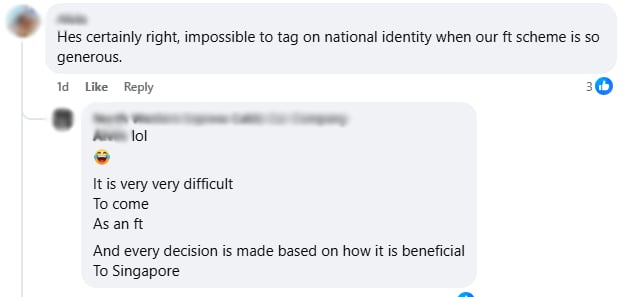
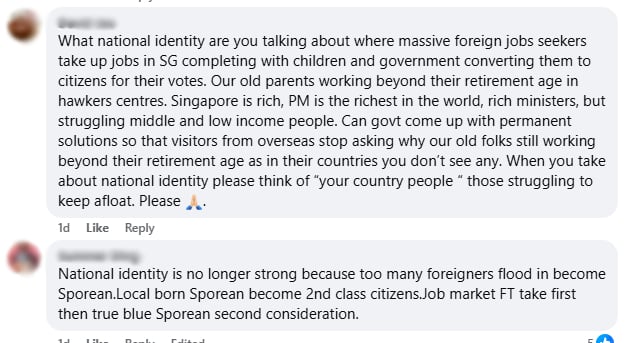
Some remarked that since the government continues to grant citizenship to so many, Singapore’s national identity has inevitably developed multiple layers.
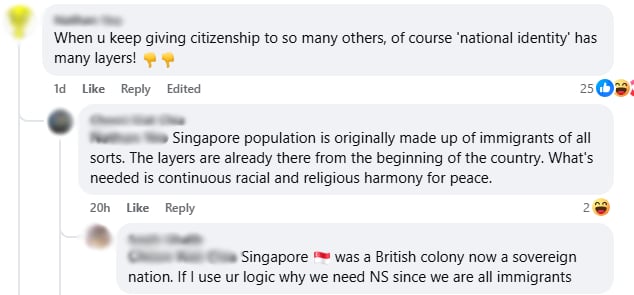

One user commented that a nation’s identity is destroyed only when an excessive number of migrants arrive within too short a time.
These newcomers often do not integrate, the user claimed, and instead of addressing this issue, leaders are attempting to redefine an identity that should never have been compromised in the first place.
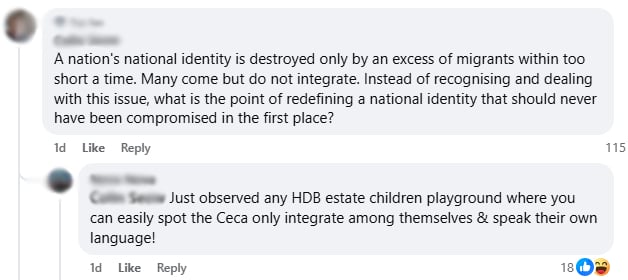
Another mocked the situation, calling “national identity” a joke and pointing out that it is no longer possible to visit a provision shop, coffee shop, or order food using the native language, Singlish.

Criticism of Government Policies
Others directly blamed government policies for the current situation.
One user wrote that after 20 years of Lee’s leadership, local-born Singaporeans have been diluted “almost to the point of oblivion”.
The user argued that imported “Singaporeans” likely carry only a superficial or temporary identity, tied more to economics than to any real sense of belonging.

Another added that the PAP had “single-handedly destroyed” the Singaporean identity set by the nation’s pioneers by favouring foreigners over locals, and elites over ordinary citizens.

One comment noted that Lee’s remarks had effectively flushed down the efforts of past campaigns built on themes such as “We. Together. United. One”.

Calls to Safeguard Core Identity
Some users stressed that national identity remains core to Singapore.
They argued that merely holding a Singapore passport does not make someone truly Singaporean. Instead, it is the shared values and culture that form the essence of citizenship.


Another warned that if Singaporeans are expected to accept that national identity is no longer a priority, then newly converted citizens may bring with them foreign influences.
The user described it as “ridiculous” that the most important aspect of national identity could exist without being rooted in Singaporeans themselves.
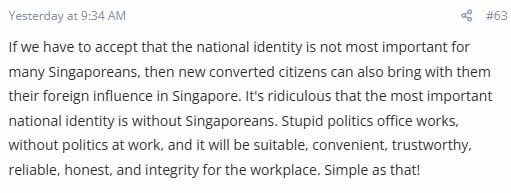
The post Netizens slam Lee Hsien Loong’s remarks on national identity, say government let too many foreigners in appeared first on The Online Citizen.


